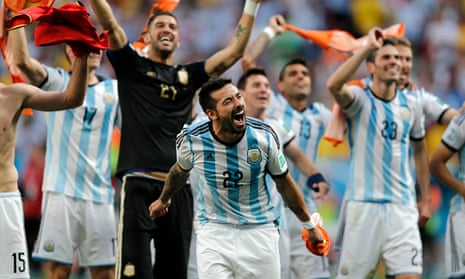Argentina believe. That much was clear from the raucous celebrations whipped up by those clad in sky blue and white in the streets of Brasília on Saturday, or the selfies tweeted by joyous players from the dressing room and on the coach en route back to the airport. It was even vaguely discernible in Alejandro Sabella’s post-match monotone, delivered through his usual mock grumpiness. This team are finding their feet.
They took a huge psychological stride in emerging victorious against Belgium and into a first semi-final at this tournament for 24 years. “We broke through the barrier,” said Lionel Messi through a beaming smile. “We’ve already succeeded in getting ourselves in the four best teams and we want more. For us to be the ones who took that step through the quarter-finals is beautiful.” With memories of Argentina’s three stumbles at this stage since Italia 90 now banished and a contest with Holland to come on Wednesday, optimism abounds.
This, like their four other wins in Brazil, may have been achieved by a narrow margin but it was more convincing than the scoreline suggested. Where Argentina had relied almost entirely on the brilliance of Messi to propel them to the quarter-finals, here teamwork triumphed. The centre-halves withstood a barrage of late Belgian pressure as the ball was flung upfield to Romelu Lukaku, Daniel van Buyten and Marouane Fellaini.
The midfield defensive shield of Javier Mascherano and Lucas Biglia worked diligently and in tandem, disrupting Belgium’s rhythm and maintaining possession as tidily as they could. “In terms of intensity, balance, intelligence and the importance of the stage, it was our best performance by far,” Mascherano said. “We played like we had to play, against a very good team, with many attacking alternatives.”
Up front it was not just Messi who revelled. Gonzalo Higuaín worked tirelessly to close down Belgium’s centre-halves or infiltrate the space vacated by defenders attracted to Messi’s darts in possession, with Higuaín’s winning goal dispatched instinctively and clinically from the edge of the area. His first reward of these finals will have bolstered his confidence with Sergio Agüero still hopeful of playing some part having recovered from a hamstring injury. Higuaín’s return to form would temper, albeit marginally, the loss of Angel di María with a torn thigh muscle. The Dutch have reason to be wary of the Napoli striker.
There is the air of Italy 2006 about this team. They are a side, like Marcello Lippi’s champions that year, who have grown slowly into this tournament and whose sheer weight of experience means they can squeeze victories from the most daunting of contests. They are streetwise, canny and awkward opponents and in Messi they have a genius who can spark at any moment, a player unbeaten in his last 25 appearances for Argentina and capable of conjuring a decisive moment.
Ally that with a newfound power of the collective and their claim to be contenders is even more persuasive. “More than ever before we were a team,” Messi said. “We ran more than ever, we were more committed than ever. We played a game that I am not used to – running, running – and it worked. Belgium didn’t have clear chances and ended up with long balls to their tall players but our centre-halves were giants. The whole team deserved praise for their sacrifice.”
Argentina will hope to be fresher than the Dutch in São Paulo on Wednesday, their late efforts to repel Belgium having ensured there was no need for extra time. Higuaín, striking the bar, and Messi’s one-on-one with Thibaut Courtois in stoppage time might have added gloss to their display, but it mattered little that those opportunities were passed up. Marc Wilmots, the Belgium coach, departed the tournament bemoaning the manner in which Argentina broke up the rhythm of the contest but he would do well to learn from such tactics.
Biglia, whose inclusion had seemed risky given his lack of pace, and Mascherano excelled in harrying, intercepting and stifling. Kevin De Bruyne, so influential in the previous round, was forced further and further from goal. Eden Hazard was peripheral and substituted. Without them, Belgium were blunt.
Even the inclusion of Martín Demichelis came off, his partnership with Ezequiel Garay abrasive and unbreached. Marcos Rojo’s return from suspension at left-back will also be a fillip. “It helped that the midfielders were so close,” Pablo Zabaleta said. “Defensively we were excellent. We knew Belgium were a very tough team physically but we defended set pieces very well. They put a lot of long balls into the box at the end but we coped brilliantly.”
Inevitably, Sabella must spend the next few days damping down all enthusiasm that was so lacking in the buildup to Saturday’s quarter-final but his dour demeanour should help. Certainly, criticism of his selection and tactics may now be put on hold until his team trot out into Arena Corinthians. “It has been such a mad World Cup that it’s hard to say whether they are champions in waiting,” said the Belgium captain, Vincent Kompany, “but they have the individuals to do it.”
Holland are more slippery opposition, their own experience across the frontline likely to pose a different kind of problem. But momentum is now with Argentina.
